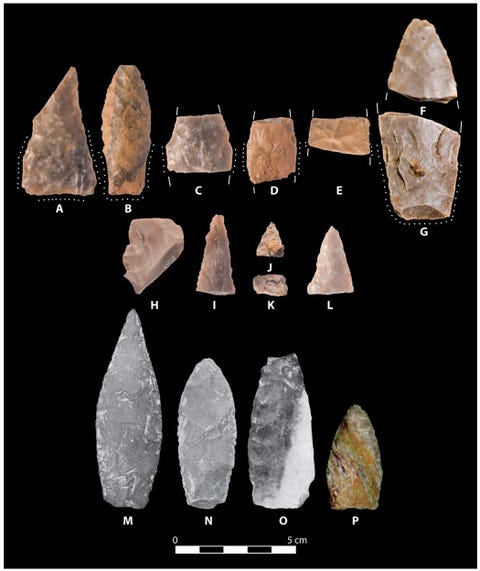The Oldest Weapon Discovered in North America is a 15,000-Year-Old Spearhead
The weapon has archaeologists rethinking America's earliest settlers.
By David Grossman TEXAS A & M UNIVERSITY
TEXAS A & M UNIVERSITYArchaeologists in Texas have discovered what they believe are the oldest weapons ever found in North America: spear-point tips from 15,500 years ago. Ostensibly used to hunt game, the weapons offer new insight about the continent's earliest settlers, according to a new paper published in Science Advances.
The weapons, which were found at a site in Texas named for its landowner, Debra L. Friedkin, appear to predate the Clovis people, a paleo-Indian culture believed to have settled North America some 13,000 years ago, during the final stages of the Late Pleistocene era. A team from Texas A&M, Baylor University and the University of Texas found the tools buried near Buttermilk Creek, Texas, in a layer underneath spearheads from the Clovis and the Folsom traditions (the Folsom people lived later—from 9,000 to 8,000 BCE).
The spear points were a momentous find, said Michael Waters, distinguished professor of anthropology and director of the Center for the Study of the First Americans at Texas A&M, in a press release. Prior to the discovery, spear points hadn't been found at any pre-Clovis sites.
"The dream has always been to find diagnostic artifacts—such as projectile points—that can be recognized as older than Clovis, and this is what we have at the Friedkin site," he said.

A collection of pre-Clovis projectile points, mostly from the Debra L. Friedkin site in Texas. M,N and O are from Mexico, P is from Pennsylvania.
MICHAEL R. WATERS, JOSHUA L. KEENE, ET AL.
In short, small finds of archeological evidence from Florida, Wisconsin, Washington and Oregon have started to convince scientists that the Clovis were not the first peoples in North America, and that humans settled here closer to 14,000 to 15,000 years ago. These spear points support that idea. "The findings expand our understanding of the earliest people to explore and settle North America," Waters said. "The peopling of the Americas during the end of the last Ice Age was a complex process and this complexity is seen in their genetic record. Now we are starting to see this complexity mirrored in the archaeological record."
It's been a good year for finding important stuff just lying around. Earlier this year, scientists found what they believe to be Europe's oldest bronze sculpture, tools in India that were made before humans were supposed to have left Africa, and even some extremely old bread.
Source: Texas A&M
No comments:
Post a Comment